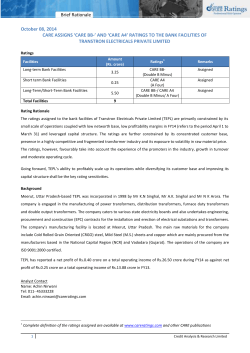
Prospect Ratings Demystified
Or How to read that “stuff” in Wizard Lai Lonne Fong Dorothy U. Oluonye Jessica Messerschmitt Why have ratings? Determine Wealth Levels Gift Capacity Propensity to Give Frequency of Giving Likely Gift Type (CRT, Bequest, etc.) Who has ratings All Domestic Alumni (unless they are deceased) Many Foundations and Corporations (older records— no longer reviewed) Certain Friends (most at this point) Making a recommendation based on an analysis of financial and other factors about the range of gift possible from a prospect. (Cecilia Hogan; Prospect Research—a Primer for Growing Nonprofits; Jones and Bartlett, c. 2004) What it Means Definition 1: 3% to 5%, conservatively calculated, of Demonstrated Net Worth Definition 2: What a prospect can be expected to expend philanthropically over the course of his or her lifetime—to any charitable institution (not just CWRU) Why? Prospects need to be “binned” in categories by wealth on an absolute scale—Who is the richest and what percentage can we get? Propensity is NOT at issue here, just wealth Where to Find it On the front Screen in the Purple Quadrant NOT THE WHOLE PICTURE—Drill down!! Three types of rating: LIFETIME NEEDS RESEARCH APPROVAL NO LONGER VALID How is Lifetime Rating Calculated Balance Sheet Model Assets – Liabilities = Net Wealth Industry Standard Formulas for Calculating Net Worth—Several Scenarios Formulated Most likely scenario is used based on combination of “hard” and “soft” data (contact reports, news articles – other giving, etc.) Ratings Control Research Office has last word…BUT! Ratings will be changed if proof is offered Propensity to give to CWRU not a factor Ratings are reviewed from time to time How Ratings Stack Up Up to $100M: 3 Alumni, 24 Friends Up to $50M: 2 Alumni, 6 Friends Up to $25M: 20 Alumni, 26 Friends Up to $10M: 45 Alumni, 54 Friends Up to $5M: 213 Alumni, 137 Friends Up to $2.5M: 60 Alumni, 54 Friends Up to $1M: 224 Alumni, 99 Friends Ratings from $100K - $500K not fully approved: there is much room for growth!! Expectation Field Found on Prospect Screen Intended for Fundraiser use Completely user-defined The PRIZM System NE Classifies thousands of neighborhoods in 66 lifestyle segments, each a distinct marketplace group Provides a highly accurate measure of socioeconomic standing, philanthropic tendency, and lifestyle indicators (Source: GGA presentation, 2005) PRIZM Variables NE Social Rank (income, employment, education) Household Composition Mobility (length of residence, car ownership) Ethnicity Housing Urbanization (urban/rural, housing densities) (Source: GGA presentation, 2005) Where to Find PRIZM NE Found in Demographic Profile section Codes of Importance: 1 Upper Crust 2 Blue Blood Estates 5 Country Squires 6 Winner’s Circle 7 Money & Brains 9 Big Fish, Small Pond 10 Second City Elite (6,613 hits) (3,357 hits) (5,513 hits) (2,160 hits) (6,326 hits) (6,294 hits) (2,104 hits) The GGA ratings GGA Explained Almost all individuals in Wizard were rated in 2005 Three, Four or Five ratings, found in Evaluations GGA Major Gift: A, B, C, D, E (A being the best) GGA Annual Giving: 1 through 6 (1 being the best) GGA Planned Giving: P, S, T, X (P being the best) NL (Nothing to Lose): High wealth but no giving GGA Gift Capacity Estimate (not very many records) The next wave in prospect ratings! What is Blackbaud? A Predictive Model Charts Capacity AND Likelihood Most Detailed Product Available on Market As Many as 26 Records per Prospect Blackbaud Ratings Broken Down University as a whole analyzed for: Major Gift Likelihood ($2,500 or more) Annual Giving Likelihood Annuity Likelihood CRT Likelihood Bequest Likelihood Target Gift Range (capacity) Each school analyzed separately: Major Gift Likelihood (school specific) Target Gift Range Where to Find Found in Evaluations Target Gift Range (TGR’s) Scores are from 1 to 15 (University) and 1 to 12 (schools) Likelihood Scores are from 1 to 1,000 (1,000 being the best score) Mapped into Wizard in file-specific Quartiles Ignore the $ sign on actual rating—it is a hard code Ratings Not (Yet) in Wizard From Blackbaud Wealthpoint Screening: Estimated Wealth To be mapped to a wealth field Annual Giving Capacity ($ range) Annual Giving Capacity Value ($ value) 1% of Wealthpoint total assets Major Giving Capacity ($ range) Major Giving Capacity Value ($ value) 5% of Wealthpoint total assets YOUR GUT INSTINCT!!! Looking up ratings; reports, etc. Reports where Ratings Matter File-Print-Other Brief Biographical Summary Executive Snapshot Wizard In-depth Profile High Profile Summary Report Proposal List – Entity NEW (choose school for Blackbaud) Proposal List – Prospect NEW (choose school for Blackbaud) Not all ratings appear on all reports Ratings in Advanced Look-up Tab PT (A-N) Evaluation sub-tab Use Type and Rating fields To look up Blackbaud data: Best interpreted as a combination of MGL and TGR You must do two searches and use intersecting clipboards For PRIZMNE Tab PT (A-N) Demographic Profile sub-tab; use Level field dso@case.edu duo1@case.edu jlm67@case.edu
© Copyright 2025















